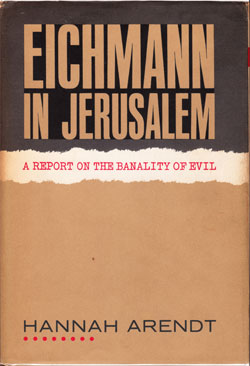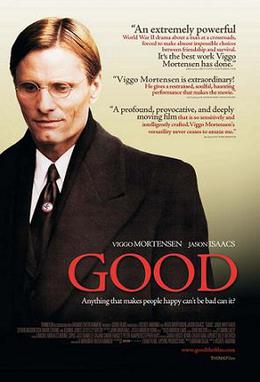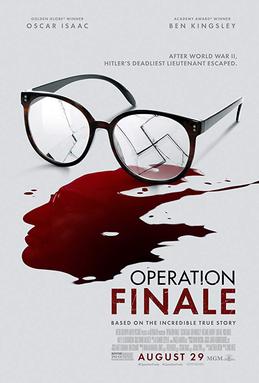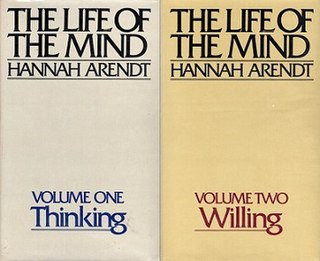
Hannah Arendt was an American historian and philosopher. She was one of the most influential political theorists of the 20th century.

Margarethe von Trotta is a German film director, screenwriter, and actress. She has been referred to as a "leading force" of the New German Cinema movement. Von Trotta's extensive body of work has won awards internationally. She was married to and collaborated with director Volker Schlöndorff. Although they made a successful team, von Trotta felt she was seen as secondary to Schlöndorff. Subsequently, she established a solo career for herself and became "Germany's foremost female film director, who has offered the most sustained and successful female variant of Autorenkino in postwar German film history". Certain aspects of von Trotta's work have been compared to Ingmar Bergman's features from the 1960s and 1970s.
David Cesarani was a British historian who specialised in Jewish history, especially the Holocaust. He also wrote several biographies, including Arthur Koestler: The Homeless Mind (1998).

Gideon Hausner was an Israeli jurist and politician. Between 1960 and 1963, he served as Attorney General and was later elected to the Knesset and served in the cabinet.

Eichmann in Jerusalem: A Report on the Banality of Evil is a 1963 book by political thinker Hannah Arendt. Arendt, a Jew who fled Germany during Adolf Hitler's rise to power, reported on the trial of Adolf Eichmann, one of the major organizers of the Holocaust, for The New Yorker. A revised and enlarged edition was published in 1964.

"Little Eichmanns" is a term used to describe people whose actions, while on an individual scale may seem relatively harmless even to themselves, taken collectively create destructive and immoral systems in which they are actually complicit. The name comes from Adolf Eichmann, a Nazi bureaucrat who helped to orchestrate the Holocaust, but claimed that he did so without feeling anything about his actions, merely following the orders given to him.

Barbara Sukowa is a German actress of screen and stage and singer. She has received three German Film Awards for Best Actress, three Bavarian Film Awards, Cannes Film Festival Award for Best Actress, Venice Film Festival Award, as well as nominations for European Film Awards, César Awards and Grammy Awards.

Voyager is a 1991 English-language drama film directed by Volker Schlöndorff and starring Sam Shepard, Julie Delpy, and Barbara Sukowa. Adapted by screenwriter Rudy Wurlitzer from the 1957 novel Homo Faber by Max Frisch, the film is about a successful engineer traveling throughout Europe and the Americas whose world view based on logic, probability, and technology is challenged when he falls victim to fate, or a series of incredible coincidences.

Marianne and Juliane, also called The German Sisters in the United Kingdom, is a 1981 West German film directed by Margarethe von Trotta. The screenplay is a fictionalized account of the true lives of Christiane and Gudrun Ensslin. Gudrun, a member of The Red Army Faction, was found dead in her prison cell in Stammheim in 1977. In the film, von Trotta depicts the two sisters Juliane (Christine) and Marianne (Gudrun) through their friendship and journey to understanding each other. Marianne and Juliane was von Trotta's third film and solidified her position as a director of the New German Cinema.

Günther Anders was a German-born philosopher, journalist and critical theorist.

Good is a 2008 drama film based on the stage play of the same name by Cecil Philip Taylor. It stars Viggo Mortensen, Jason Isaacs, and Jodie Whittaker, and was directed by Vicente Amorim. The film premiered at the Toronto International Film Festival on 8 September 2008.

Otto Adolf Eichmann was a German-Austrian official of the Nazi Party, an officer of the Schutzstaffel (SS), and one of the major organisers of the Holocaust. He participated in the January 1942 Wannsee Conference, at which the implementation of the genocidal Final Solution to the Jewish Question was planned. Following this, he was tasked by SS-Obergruppenführer Reinhard Heydrich with facilitating and managing the logistics involved in the mass deportation of millions of Jews to Nazi ghettos and Nazi extermination camps across German-occupied Europe. He was captured and detained by the Allies in 1945, but escaped and eventually settled in Argentina. In May 1960, he was tracked down and abducted by Israel's Mossad intelligence agency, and put on trial before the Supreme Court of Israel. The highly publicised Eichmann trial resulted in his conviction in Jerusalem, following which he was executed by hanging in 1962.

Rosa Luxemburg is a 1986 West German drama film directed by Margarethe von Trotta. The film received the 1986 German Film Award for Best Feature Film, and Barbara Sukowa won the Cannes Film Festival's Best Actress Award and the German Film Award for Best Actress for her performance as Rosa Luxemburg.

In 1960, the major Holocaust perpetrator Adolf Eichmann was captured in Argentina by Israeli agents and brought to Israel to stand trial. The capturing of Eichmann was criticized by the United Nations, calling it a "violation of the sovereignty of a Member State". His trial, which opened on 11 April 1961, was televised and broadcast internationally, intended to educate about the crimes committed against Jews, which had been secondary to the Nuremberg trials. Prosecutor and Attorney General Gideon Hausner also tried to challenge the portrayal of Jewish functionaries that had emerged in the earlier trials, showing them at worst as victims forced to carry out Nazi decrees while minimizing the "gray zone" of morally questionable behavior. Hausner later wrote that available archival documents "would have sufficed to get Eichmann sentenced ten times over"; nevertheless, he summoned more than 100 witnesses, most of whom had never met the defendant, for didactic purposes. Defense attorney Robert Servatius refused the offers of twelve survivors who agreed to testify for the defense, exposing what they considered immoral behavior by other Jews. Political philosopher Hannah Arendt reported on the trial in her book Eichmann in Jerusalem: A Report on the Banality of Evil. The book had enormous impact in popular culture, but its ideas have become increasingly controversial.

Vision is a 2009 German film directed by Margarethe von Trotta.
Pamela Katz is an American screenwriter and novelist best known for her collaborations with director Margarethe von Trotta, including Rosenstrasse and Hannah Arendt.

Operation Finale is a 2018 American historical dramatic thriller film directed by Chris Weitz from a screenplay by Matthew Orton about a 1960 clandestine operation by Israeli commandos to capture former SS officer Adolf Eichmann, and transport him to Jerusalem for trial on charges of crimes against humanity. The film stars Oscar Isaac as the Mossad officer Peter Malkin, and Ben Kingsley as Eichmann, with Lior Raz, Mélanie Laurent, Nick Kroll, and Haley Lu Richardson. Several source materials, including Eichmann in My Hands, by Peter Malkin and Harry Stein, provided the basis for the story.

The Life of the Mind was the final work of Hannah Arendt (1906–1975), and was unfinished at the time of her death. Designed to be in three parts, only the first two had been completed and the first page of the third part was in her typewriter the evening of the day she suddenly died. The unfinished work was edited by her friend, author Mary McCarthy, and published in two volumes in 1977 and 1978.
This is a bibliography of works by and about the philosopher Hannah Arendt.
















